

POSSIBILITIES KENCREST MAGAZINE | ISSUE 03
Stance
ABA
Taking a
on
Editor-in-Chief
Marian Baldini, CEO & President
Executive Editor
Aurora Kripa, COO
Copy Editor
Lauren Tilghman, Director of Strategic Communication & Marketing
Contributing Writers
Sydney Kerelo, Creative Content Manager
KenCrest Centers Board of Directors
Steven F. Bell • Merri Brown • Mona Burke
Kevin P. Dougher • Colin D. Dougherty
Steve Brenneman • Charles W. Horn III
Scott McCloskey • Sean Outen • Eric Rahe
Stephen Van Osten • Carol Hammarberg
KenCrest Services Board of Directors
Sheila Bruce • Mona Burke • Patricia Bush
Hal Davidow • Mamta Maini • Sean Outen
Jim Van Horn • Stephen Van Osten
Design
Sydney Kerelo, Creative Content Manager
Aubrey Hoffert, Digital Media Manager
Photography
Aubrey Hoffert, Digital Media Manager
Possibilities is published by KenCrest Services, 960A Harvest Drive, Suite 100, Blue Bell, PA 19422
How to Reach Us
610.825.9360
kencrest.communications@kencrest.org
KenCrest is a 501c3 non-profit human services provider throughout Pennsylvania, Connecticut, and Delaware.
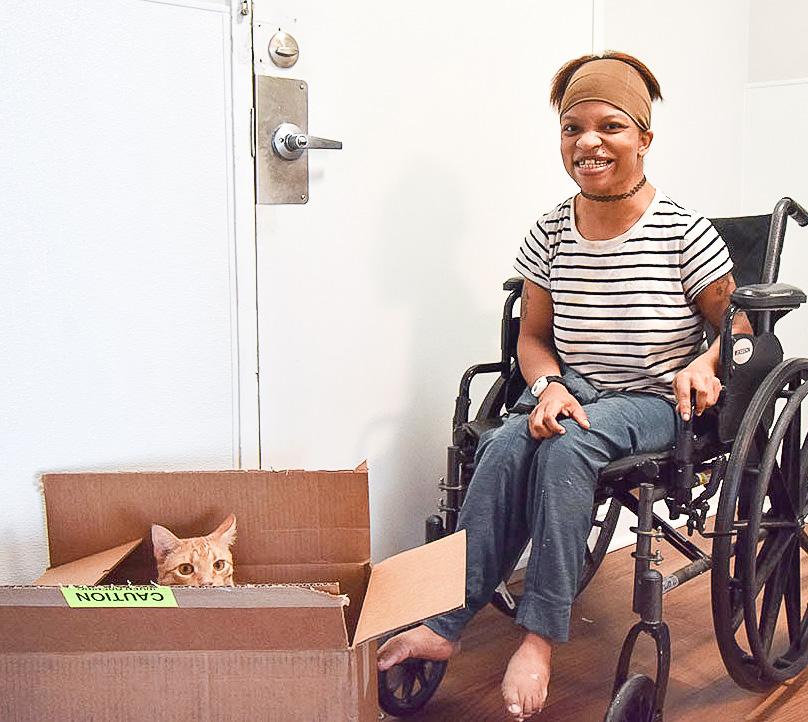
www.kencrest.org
Our Mission
KenCrest’s mission is to support community development by exploring possibilities, mobilizing resources, and empowering dreams.
April 2023
02 POSSIBILITIES | ISSUE 03 CONTENTS 04 09 12 Inspiring Friendships Through Daysharing
Published:
Meet KenCrest's Newest Executive Leaders CONTRIBUTORS & COVER: Leylanni playing outside of the Waterman Children's Transitional Home. // Cover photo by Aubrey Hoffert The Controversy Around Applied Behavior Analysis 16 Raising a Child with an Intellectual Disability 18 Transitioning to Independent Living
LETTER FROM OUR EDITOR


Dear Friends,
Spring is a season that many associate with rebirth and renewal. The days become longer, the flowers begin to bloom, and we open ourselves to the many possibilities that the warmer weather will bring. At KenCrest we’re no different, and like the weather―we’re ‘springing’ into a season full of opportunity and growth. Now more than ever we’re exploring new service lines within our programs that will lead to greater independence and more meaningful relationships for those we support with disabilities. We’re strengthening our team throughout the Agency with driven and dedicated new leaders. We’re witnessing shifts in best practices within our service models; and mobilizing staff not only to adjust our approaches to supports, but to help drive awareness and positive change―especially in early intervention therapies.
You’ll discover all of this and more as you read through this latest edition of Possibilities magazine. As you do, I hope that you too will ‘spring’ into action with us and advocate for the entire KenCrest community throughout Pennsylvania, Delaware, and Connecticut. May this new season lead to greater possibilities for us all.
Sincerely,
Marian Baldini, President & CEO, KenCrest
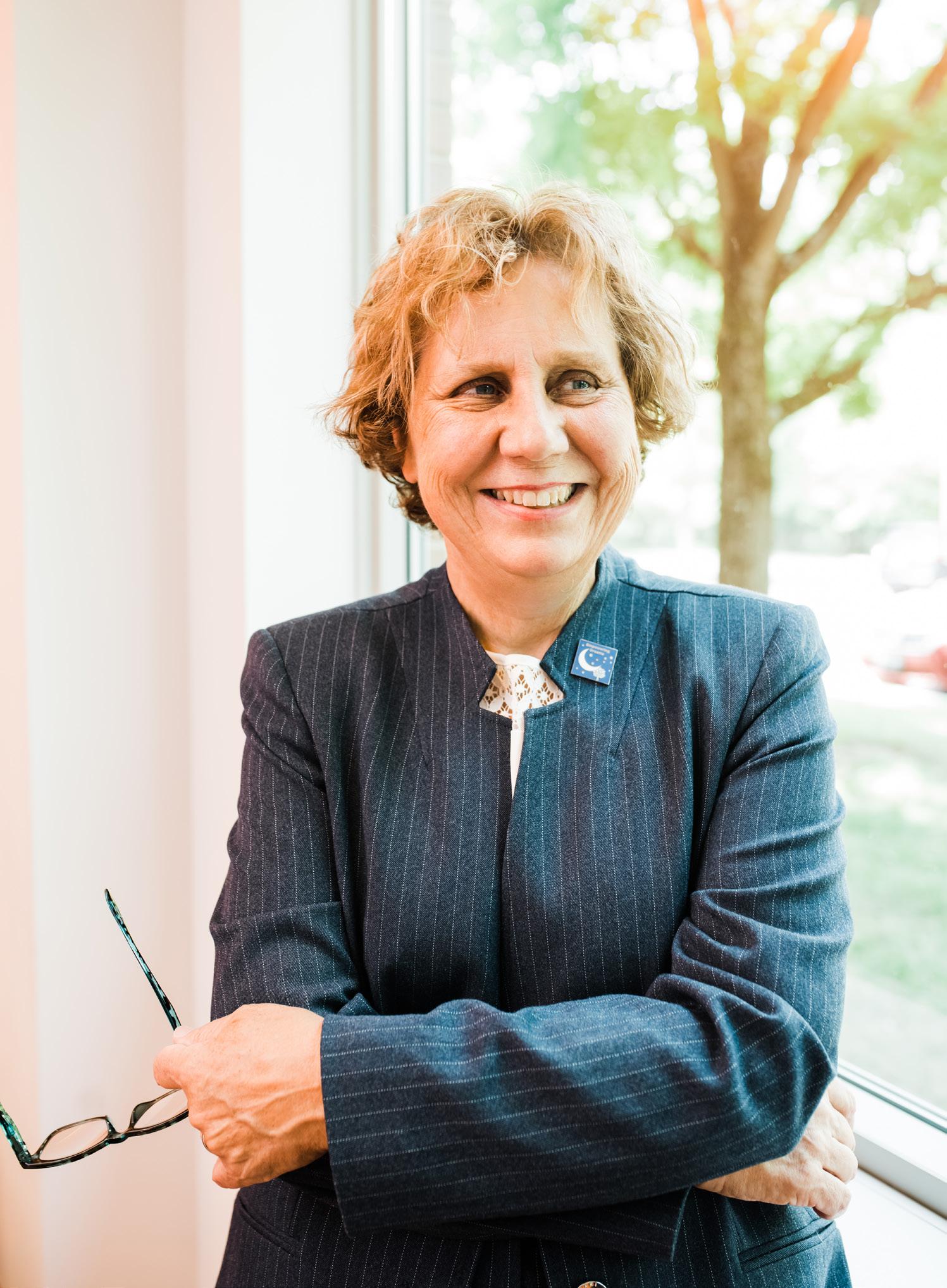
03 KENCREST.ORG
KenCrest’s Daysharing program offers those with disabilities the chance to build and sustain friendships.
Inspiring Through
Former Daysharing Coordinator and new Fund Development Specialist
Olivia Riordan embraced the flip side of Daysharing, being a friend.

Earlier this year, Riordan, with her bright smile, flowing dresses, and joyful personality, searched for a friend within the disability community she could connect with. She found her perfect match in Amanda.
Amanda is supported by KenCrest’s CommunityBased Services and is an active member of our Meaningful Day and Daysharing programs— she is also one of the co-founders of its Book Club, which is gaining traction throughout the Agency’s community participation programs.
“I was talking to family members about wanting to make more friends close to me because all of my friends live far away,” says Riordan. “And when I found Amanda and talked to her, I knew she was everything I wanted in a friend.”
Amanda and Riordan love Disney movies like High School Musical; they both studied music and shared a love for musical theater, choir, and opera. They are even working on creating a shared playlist with their favorite songs.
“She is very calming for me,” says Riordan. “Sometimes I can get very high in energy, and she will help me calm down and run deep breathing exercises for me.”
As the former Daysharing Coordinator, connecting with people has always been important to Riordan. Throughout college, she strived to connect individuals struggling to find their place within the school with friends experiencing the same. She would talk with them, discover their likes/passions, and introduce them to others with those same interests.
04 POSSIBILITIES | ISSUE 03 DAYSHARING
Daysharing
Friendships Daysharing
 By Sydney Kerelo
By Sydney Kerelo
05 KENCREST.ORG
DAYSHARING
Fund Development Specialist Olivia Riordian video chatting with her Daysharing partner, Amanda. // Photos by Aubrey Hoffert

06 POSSIBILITIES | ISSUE 03
in learning about KenCrest's Daysharing program? Visit our website at kencrest.org/day-sharing for more information!
Interested
“While studying for my undergraduate degree, I studied Music and American Studies, focusing on the study of systemic inequalities within the United States,” explains Riordan. “One of my work-study jobs was working on advocating for Disability Rights, and I loved it.”
According to Riordan, people historically thought that food, water, and shelter were the only necessities for living a good life. But that’s not true. When considering a holistic life, all individuals need human connection and interaction.
Riordan has met numerous people with disabilities who have told her they’ve never had a friend. They’ve only had paid staff or family members; they’ve never had someone to hang out with who likes talking to them without payment.
“You can be close with a staff person or family member, but it’s a different dynamic than being close with a friend,” says Riordan. “Amanda is my friend; it’s not work for me. When we video chat, I don’t do it from my office; I do it in my bedroom to create that separation.”
And for Amanda, it’s a new friend to enjoy. With a full life, Amanda juggles her friendships in Daysharing, her family, her boyfriend, and her job; but she adores spending time with Riordan every week.
Daysharing allows people with disabilities to

create those shared connections and learn how to be a friend back. If someone has never had a friend, they may be unsure how to address someone or don’t know how to handle a taboo topic. Daysharing lets them have those interactions and learn how to create healthy friendships and sustain them.
“Amanda has become such an important part of my life,” says Riordan. “She told me that meeting me was one of the best things ever happening to her.”
Every week, Amanda and Riordan meet for a virtual chat and share what they’ve done that week, what shows they’ve enjoyed watching, and even current projects they are working on.

Amanda is writing a soap opera script on a teen drama with themes of love, mystery, and danger. She highlights different healthy and unhealthy relationship styles and offers a diverse cast full of people with disabilities and those that are neurotypical.
“It’s very vulnerable to put yourself out there, but I think having the extra support from friendships is incredibly helpful,” says Riordan with a smile. While the pair’s friendship was built virtually, both look forward to connecting for more inperson dates in the coming months, especially over their shared love of a new Disney movie— The Little Mermaid.
07 KENCREST.ORG
FROM LEFT TO RIGHT: Amanda and Olivia Riordian // Photo by Aubrey Hoffert
DAYSHARING
Rewriting your will?
Please consider including KenCrest in your legacy plan.
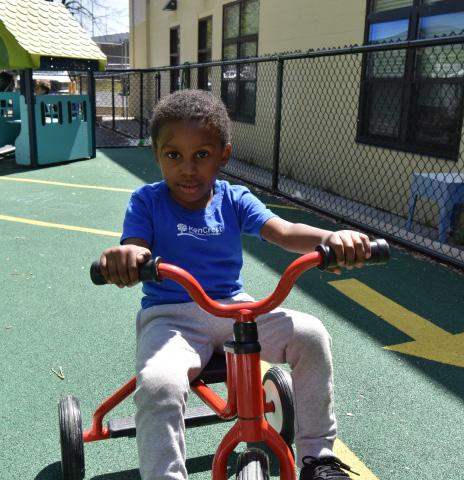

A bequest is a gift left to a person or organization through a will, and it’s among the easiest, most popular, and most flexible planned giving tools. Charitable bequests are often cash (such as $25,000), a percentage of the estate (10% of an $850,000 estate), or the estate’s value after everything else is paid out.



For more information, please get in touch with:
Ellen Mansfield Chief
Development
Officer
610-825-9360 ext. 1023
Or Scan the QR Code!

08 POSSIBILITIES | ISSUE 03
Meet KenCrest’s Newest Executive Leaders
By Sydney Kerelo
Ellen Mansfield, Chief Development Officer

As a history major working for the Pennsylvania Historical Museum Commission, Ellen Mansfield had no idea that her career would lead her to a nonprofit supporting people with intellectual and developmental disabilities.
Growing up, her parents were avid helpers. Her mother was a cancer nurse, while her father worked for the Army Corps of Engineers as a flood expert, and he would advocate for people who lived in a floodplain to get their homes bought out so they could move somewhere safer.
Mansfield admired their commitment to helping others and knew she wanted to do the same in her career. So, she left her first post-college job at a historic site and joined the fundraising team at her alma mater, Ursinus College. After working at two other educational institutions, she began working for the Center for Autism as a Grant Writer to hone her craft. This was the first human services organization she worked for. “I didn’t know much about Autism when I started, so I read everything I could, joined as many online groups and email listservs as I could to better understand what individuals with autism and their families needed.” Then, Mansfield left the Center for Autism to work for Melmark as the Annual Giving and Grants Manager, then the Director of Advancement before coming to KenCrest.
“I applied to KenCrest back in 1999,” she laughs. “They have an excellent reputation, and I admire how the Organization tried to adapt to the future and be inclusive. I admire that we serve various people and offer meaningful opportunities.”
KenCrest welcomes several new Senior Leaders within our Delaware and Pennsylvania programs this year.
09 KENCREST.ORG Executive Leadership
Executive Leadership
Brett Askin, Executive Director of Adult Residential in Delaware
With a Psychology degree and 12 years of experience working within group homes, Brett Askin understands the ins and outs of Community Living. Askin joined the KenCrest family last December as a Division Director for New Castle County before becoming the Executive Director of Adult Residential in Delaware in January 2023.

Previously, Askin served at Chimes, where he worked his way through their residential program as the Residential House Manager, Residential Coordinator, Program Coordinator, and finally, the Assistant Director of Residential Services.
“At the time, the Organization was making some changes that I didn’t view as person-centered,” says Askin. “So, when applying to jobs, I was looking for a company that I thought would offer that person-centered approach.”
Now, in his newest position, Askin oversees all 20 of KenCrest’s adult Community Living homes in Delaware, and one of his favorite aspects of the job is visiting the homes. He was impressed with how the houses were decorated and how the entire Delaware team prioritized the happiness of each resident.
“I like going downstate and seeing the new sites, how well the staff is doing, and making sure everyone feels comfortable,” he says. “And this new role gives me that opportunity.”
Gregg Kelinson, Assistant Vice President of Innovation
For over 35 years, Gregg Kelinson’s worked in the human service industry, bringing efficiency and access to the people he's supported through Enabling Technologies. As the recent Assistant Vice President of Innovation at KenCrest, Kelinson hopes to help the Agency find new and creative ways to become more efficient through technological innovation.
Previously, Kelinson worked for JEVS Human Services as the Vice President of Technical
Operations. He helped create systems that reduced costs and invoked automated purchasing and HIPPA-compliant paperless systems. He hopes to enact other procedures within KenCrest to better support those with a disability.
“There is an emphasis on enabling technology, and I believe that it is here now and will be the way of the future,” says Kelinson. “Technology helps people become more independent, but also it allows us to become more efficient and have more
10 POSSIBILITIES | ISSUE 03
Melinda South, Executive Director of Community Collaborative Services, Region Two
In October 2022, Melinda South became the Executive Director of Community Collaborative Services for Region Two in Pennsylvania. Since her graduation from college, South has wanted to work in a field supporting people, whether those with a brain injury or in IDD services. She began working for ReMed, as a Practice Manager supporting adults with an acquired brain injury. From there, South managed ReMed’s program for adults and children with autism before transitioning to Keystone Human Services’ Regional Director, and then Bancroft as a Director before she became the Executive Director of Adult Residential for KenCrest Delaware.
“Working with adults and children with autism sparked a love of supporting people,” says South. “And what I love about KenCrest is being in a company that puts gratitude in the forefront; I think it leads us to be innovative.”

South has always wanted to work with KenCrest, so she jumped when this opportunity presented itself to lead the Delaware Adult Residential division. In October 2022, she transitioned into her newest position. For the past few months, she’s found that this change in roles allows her to be curious, learn, and explore the different areas of the industry.

“I’m excited that I have the opportunity to learn more about vocational services and the much larger portion of residential services in PA, where we’re supporting people with IDD,” says South.
objective data.”
While Kelinson’s only been with KenCrest for a short time, he is excited to learn the ins and outs of how KenCrest operates and discover the best solutions for different pain point areas. Including developing a strong, creative, and technologically competent team to serve the people, KenCrest supports’ Enabling Technology needs better.
11 KENCREST.ORG
Executive Leadership
The AroundControversy BehaviorAppliedAnalysis
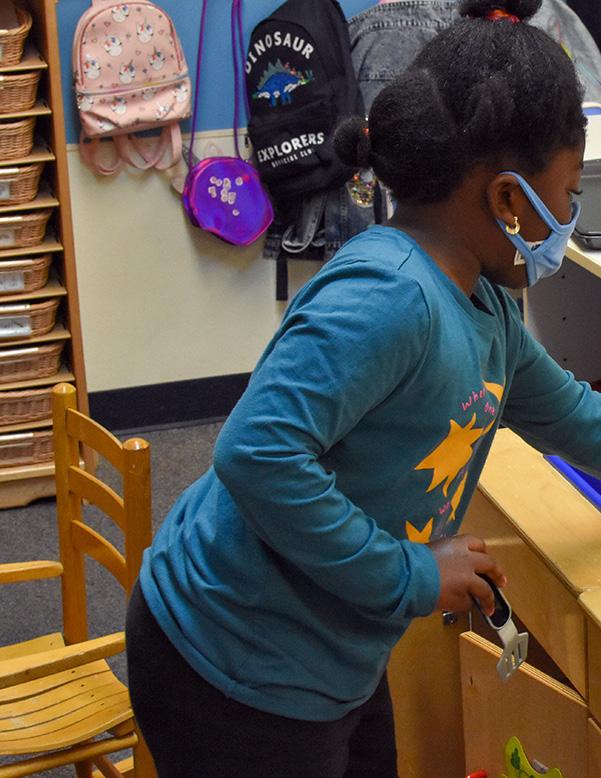 By Sydney Kerelo
By Sydney Kerelo
12 POSSIBILITIES | ISSUE 03 APPLIED BEHAVIOR ANALYSIS
Applied Behavior Analysis
ControversyAppliedAnalysis
In the mid-1960s, Dr. Ivar Lovaas—a NorwegianAmerican clinical psychologist and professor at the University of California—developed the first form of Applied Behavior Analysis to teach language to children with autism. Since then, Applied Behavior Analysis (ABA) has taken many forms, and is used to reinforce certain behaviors through a strict drill-based intervention. According to the Behavior Analysis Certification Board, ABA involves teaching behavior "essential to functioning effectively in the home, school, and community. ABA can also decrease severe problem behaviors that endanger health and safety and limit educational, residential, or vocational options."
Dr. Lovaas's program involved 40 hours a week of intensive and rigid clinic-based ABA to reinforce good behaviors. But while his program proved successful, its practice is often controversial.
"ABA is a rigorous drill-based intervention for children with challenging behaviors, specifically children with autism," says Roseann Adamo, KenCrest's Executive Director of the Birth-toFive Home and Community Based Program.
"It's the idea that we can increase reinforced behavior over time and through repetition while decreasing behavior that is not supported."

has undergone scrutiny for its strict instruction, and these KenCrest experts discuss its influence
With more than 45 years in education, Adamo has seen numerous children receiving ABA drills, and they are extensive. According to her, children will receive up to 20 hours a week of ABA drills, like putting pegs in a can or putting together puzzles, and at the end, their reward is a piece of candy.
"Because of the extensive drills, I've observed situations where the ABA person comes to the door, and the child immediately tried to get away," says Adamo. "That's not a good sign that this is working."
The goal was to encourage growth for each child and elicit a response when addressed by parents or teachers appropriately—and it worked for a time until those children only used those skills in the setting taught in.
"In the long run, we're not doing any healing; we're only band-aiding the problem," says KenCrest's Director of Behavioral Health, Dr. Autumn Dae Miller. "Hundreds of autism sites talk about the anxiety caused by ABA and not being allowed to be oneself. Imagine if someone constantly repeatedly tells you that your stimming behaviors, which help you manage anxiety, are not allowed. You are going to develop other ways to cope, and sometimes that can be unhealthy and can lead to more severe illnesses like developing a gastrointestinal disorder."
Dr. Autumn Dae Miller runs KenCrest's Clinical Services department, working closely with children and adults looking for behavior, sexuality, and communication therapies. Many individuals she serves experience depression and anxiety because of their treatment as children.
"When these children grow into adults and turn 21, they go from that contingency-based world into one where everything is an option," says Miller. "They have no concept of self, no choices have been their own, and that can cause them to become dependent on other people rather than learning how to be independent."
At KenCrest, our Early Intervention program uses Positive Behavior Support, a model that uses basic ABA principles in a more impactful and progressive way.

When a child exhibits a challenging behavior, the first step in Positive Behavior Support is to identify why the behavior is occurring through a conversational behavioral assessment. The interventionist and the parent converse about the behavior and determine whether
it's tangible, escape, or sensory and the reasons behind it. From there, they build up a list of what that child's high interests are like— getting mommy's tickles or hugs—and develop a plan of action to gain that child's attention while teaching skills that will help them throughout their daily routines at home or school.
That's where the ABA principles come in, but the difference is that the interventionist understands the child's routines at home and can help identify the most challenging part of the day and build from there.
Positive Behavior Support builds relationships between the child and their parents, caregivers, or teachers who interact most with them.
"The child should learn what they need to do or what is acceptable in their environment and routines," says Adamo. "It's about interacting with the environment, building relationships, and teaching children with autism to utilize these skills in their daily lives."
"We should be curious observers and earn the trust that has been consistently unavailable to people," adds Miller. "We must constantly build a foundation of trust, connection, and understanding to help that child grow into a successful adult."

14 POSSIBILITIES | ISSUE 03 APPLIED BEHAVIOR ANALYSIS
Leylani smilling for the camera at one of our Childrens
Transitional Homes //
Photo by Aubrey Hoffert
Interested in learning more about KenCrest's Early Intervention program? Visit kencrest.org/ earlyintervention

15 KENCREST.ORG
Theo Rosenfeld, a KenCrest client within our Early Intervention program // Photo by Aubrey Hoffert
From Parent to Parent: Raising a Child with an Intellectual Disability
When our younger son, Patrick, was born with Down syndrome, I wasn’t a big fan of the word “special.”
Special seemed to scream different, separate, less than—all the things I didn’t want for the lively, alert baby we would bring home.
Thirty-three years later, I know what so many other parents of people with so-called special needs know: that it isn’t their disabilities that make our children special. Instead, it’s what we discover about them as they grow and change, like all children, developing specific interests and personalities to become uniquely themselves.

Yes, Patrick is a member of what his father and I sometimes jokingly refer to as his tribe. A third 21st chromosome is a genetic anomaly that expresses differently in every person. But there are enough with physical similarities that meeting others with Down syndrome can sometimes feel like encountering my son’s extended family.
Which, honestly, is cool, especially when having Patrick along gives me an automatic in with strangers whose toddlers’ extreme cuteness brings me back to the days when I thought mine was the only beautiful kid with an extra chromosome.
But Trisomy 21, or Down syndrome, is not what makes Patrick special to us. Down syndrome didn’t, for instance, give him an encyclopedic knowledge of black-and-white monster movies,
16 POSSIBILITIES | ISSUE 03 PARENTING COLUMN
Former Philadelphia Inquirer writer Ellen Gray reflects on her journey with her now-adult son.
leading to conversations like the one where he informed me that John Barrymore’s 1920 performance was the best of the Jekyll and Hydes. How many millennials have even heard of Drew Barrymore’s long-dead grandfather, much less know his work?
Whether we get the news of our kids’ disabilities at the very beginning of their lives or after an extensive evaluation of delays and differences, I’m betting most parents could tell you stories about how their children color outside the lines of their diagnoses.
If only by being themselves. Of course, they have special needs. Who doesn’t? In a perfect world, we might all get a bit of occupational or physical therapy. The things we learned from the teachers and therapists in Patrick’s KenCrest Early Intervention program would have been great to know when we were first-time parents, making it up with his older brother as we went along.
What would I have done differently if I’d known then what I know now? I like to think I’d have gotten more sleep. Patrick slept through the night at three weeks. I stared at the ceiling, pondering his future.
I’d have worried less about those early IEP evaluations, where his development was expressed in terms of the age that supposedly typical infants and toddlers reached the same milestones. That he rolled over in one direction at
six weeks but not the other until seven months, or didn’t walk until 21 months, turns out to be about as significant as my college GPA at this point. Though I will never forget the great physical therapist who got down on the floor to demonstrate the difference between “mature” and “immature” crawling.
I’m grateful to those who’ve devoted their careers to helping people with disabilities realize their potential. But I’m equally grateful to the teachers who embraced inclusion, giving Patrick an education that was all the richer for being pitched above his perceived level. From the Montessori teachers who taught him to read to his extraordinary one-on-one aide, who stayed by his side from fourth grade through high school graduation, so many great people have helped him become the caring, responsible—and OK, slightly monster-obsessed—man he is today. And if that’s what being special brings, I can live with it.

Ellen Gray is a former reporter, editor, and television critic for the Philadelphia Inquirer and Daily News. She and her husband, Al Heavens, live in South Jersey with their son Patrick. As parents of a son with an intellectual disability, they been a part of the KenCrest family for many years and continually support our organization's mission to explore possibilities, mobilize resources, and empower dreams.

17 KENCREST.ORG
TransitioningIndependent

18 POSSIBILITIES | ISSUE 03 SUPPORTED INDEPENDENT LIVING
Transitioning to Independent Living
By Sydney Kerelo
SSince enacting the Americans with Disabilities Act in 1990, many people with disabilities have gained greater opportunities, autonomy, and the option to become more immersed within their communities. It’s led to the creation of programs like Supported Living Services, which have opened the door for many intellectually disabled adults to achieve true independence.
KenCrest’s Supported Independent Living program enables people to live self-sufficiently through a broad range of flexible supports within the community of their choice.

But how does that person know that an independent living program is right for them?
Approved in April 2022, the Stepping Stones Transitional Housing Program is a New Business Idea (a KenCrest-led grant opportunity to fund ideas, service delivery, and innovations) that provides additional support for those wanting to explore and work towards living in an independent setting.
“This program provides the opportunity for those we serve not just to hear about the possibility of independent living but to practice and experience the process; they get to drive the train on their steps to independence,” says Angela Marshall, the Director of Supported Independent Living. Achieving an independent life starts with meeting each individual right where they are, whether living in a Community Living Arrangement (group home) or within their family home. Once a prospective client, their family, and support team discuss the possibility of independent living, they can send a referral to Marshall, herself, or the Transitional Housing Program Coordinator, Vincent Waskiewicz. From there, the Supported Independent Living team will meet with the participant and their team to chart their LifeCourse, a person-centered plan that helps those KenCrest supports to plan their life, personal goals, and desired outcomes. A visual tool, it allows each person to process the action
19 KENCREST.ORG SUPPORTED INDEPENDENT LIVING
KenCrest’s Transitional Housing Program allows individuals with an intellectual or developmental disability to live independently.
steps and time frames needed to reach their dreams and ambitions.
The support staff will regularly check in on each client's progress while they move toward accomplishing their individualized goals. As that person’s development continues, they will spend time— with or without a staff member— in a transitional home setting, where they can practice the daily living skills needed for a fully independent environment.
“It’s important to offer this type of program because it gives participants real-life and realtime experience to practice and prepare for independent living beyond the walls of a group home,” says Marshall. “We have three ladies and one gentleman participating in the program, who are ready to live independently.”
A unique benefit of KenCrest’s Supported Independent Living and Transitional Housing Program is the inclusion of resources through the Enabling Technology program. Headed by Gregg Kelinson, Assistant Vice President of Innovations, the Enabling Technology department utilizes various technological devices to promote a safe, independent environment, such as home
sensors, smart speakers, communication systems, adapted tools, and positioning equipment.

“Many of those technologies, not all, but many offer the capability for somebody to get support in a new way, like remotely,” says Kelinson. This is extremely important for someone with a disability who is learning to live independently for the first time. Support staff can connect with clients through video equipment, like a Ring doorbell or Echo Show to see what is going on or assist participants when needed.
For those participating in the Supported Independent Living and Transitional Housing Program, not only will they discover their goals and dreams, but they will still have access to supports like help with cooking and cleaning or transportation to medical appointments depending on their skills, needs, and where they ultimately want to live.
“I hope that others (staff, supported individuals, families) hear about the successes as they come,” says Marshall. “And it will open them up to ‘exploring the possibilities’ of living independently.”

20 POSSIBILITIES | ISSUE 03
SUPPORTED INDEPENDENT LIVING Interested in learning more about KenCrest's Supported Independent Living Program? Visit KenCrest.org/SIL
Patricia McLean and her cat, Lucky in her apartment // Photo by Aubrey Hoffert
Learn how PA tax credit programs benefit KenCrest and YOU!

Did you know that you can reduce your corporate or personal PA tax liability while providing life-changing scholarships to children whose families are in financial need? As a designated Pre-K Scholarship Organization (PKSO), contributions made to KenCrest’s scholarship fund enable the business community to be directly involved in the academic success of Philadelphia’s youngest learners. Through our partnership with Central PA Scholarship Fund, we also help new, individual donors receive EITC tax credits.
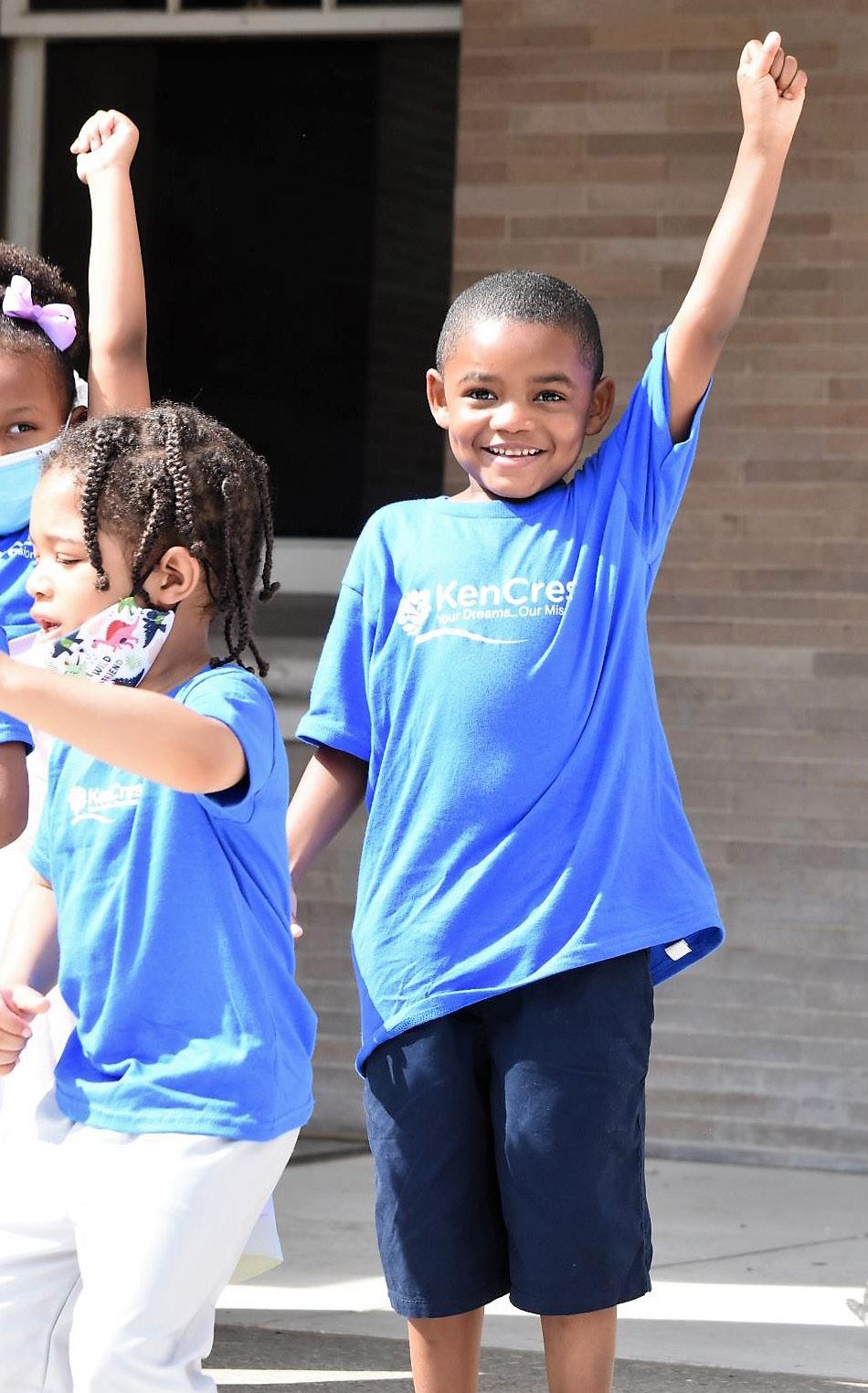
Since 2013, KenCrest’s tuition assistance program has helped hundreds of families by awarding short-term scholarships to those who are on waiting lists for state-subsidized childcare or who are temporarily unemployed, and longer-term scholarships to low-income families not eligible for state subsidies. By helping low-income children build academic and social skills, promoting their cognitive development and mental health, and preparing them to succeed in school, businesses and individuals are making an investment in the workers, leaders, and innovators of tomorrow.
For more information about participating in KenCrest’s EITC or SPE programs, contact our Director of Corporate & Foundation Relations at (610) 825-9360 ext.1123
21 KENCREST.ORG
Did you know most human services are funded through Home and Community-Based Services?
In 1983, the US Federal government launched Home and Community-Based Services (HCBS), allowing states to receive a Medicaid waiver from those with intellectual and developmental disabilities, ensuring that each person can make their own choices regarding their care. This waiver supports millions of people with disabilities that they can live within their community of their choosing, in their own home, rather than in a long-term care facility. Currently, the Department of Human Services provides 12 HCBS programs including the Community Living Waiver, Community HealthChoices, Act 150, the Adult Community Autism Program, Person/ Family-Directed Support, Infants, Toddlers, and Families waiver, and more.
According to the Kaiser Family Foundation (KFF), there are nationally three million people receiving HCBS support through waivers and over 2.5 million people receiving support as part of the state plan benefit package.
But, while more than three million people receive support, the government spending is disproportionate to the number of people served. According to KFF, per-person costs for the human services population are higher than per-person costs for seniors and adults with physical disabilities. But under federal law, services provided in nursing homes are mandatory, while most HCBSs’ are optional, leaving the IDD population lacking funds. Low funding causes wait lists for thousands of adults with disabilities.
KenCrest is committed to advancing public policy that promotes authentic inclusion for people with intellectual and developmental disabilities and their families. As well as policies supporting quality education, care, support for children's growth, and workforce support, including Direct Support Professionals and Early Learning Educators. Join the KenCrest Advocacy Grassroots Network to help support our efforts, remain in the loop on action alerts, and occasionally contact legislators regarding essential issues in our community.
To learn more about KenCrest’s Advocacy in Action or to sign up for our network, visit KenCrest.org/advocacy. Scan the QR code to learn more about the importance of HCBS funding.

22 POSSIBILITIES | ISSUE 03
JOIN OUR BOARD
KenCrest is seeking passionate and engaged community members to join our Board of Directors. Working alongside KenCrest as a board member is a great way to advocate for the equality and equity of people who are often marginalized in one way or another.
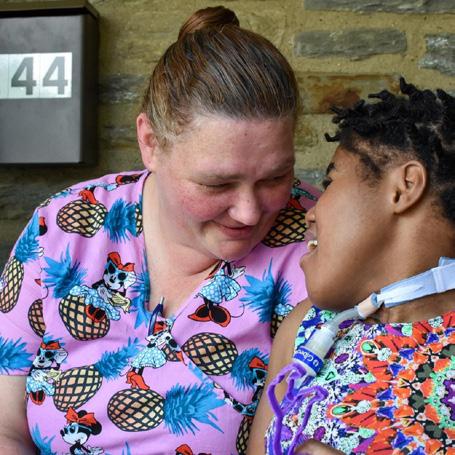


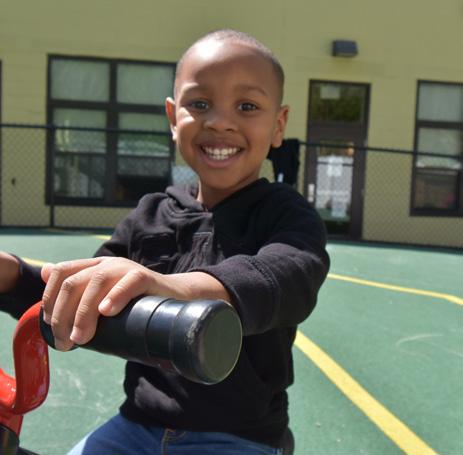

Members of the KenCrest board have a unique opportunity to be on the forefront of trends in the human service industry. Kencrest welcomes and encourages applicants of all backgrounds and abilities to apply for consideration. We are seeking specific expertise in government relations, financial, and healthcare management.
For more information or to apply, submit your resume and cover letter to Joy Reiss, Chief of Staff, at JReiss@kencrest.org.
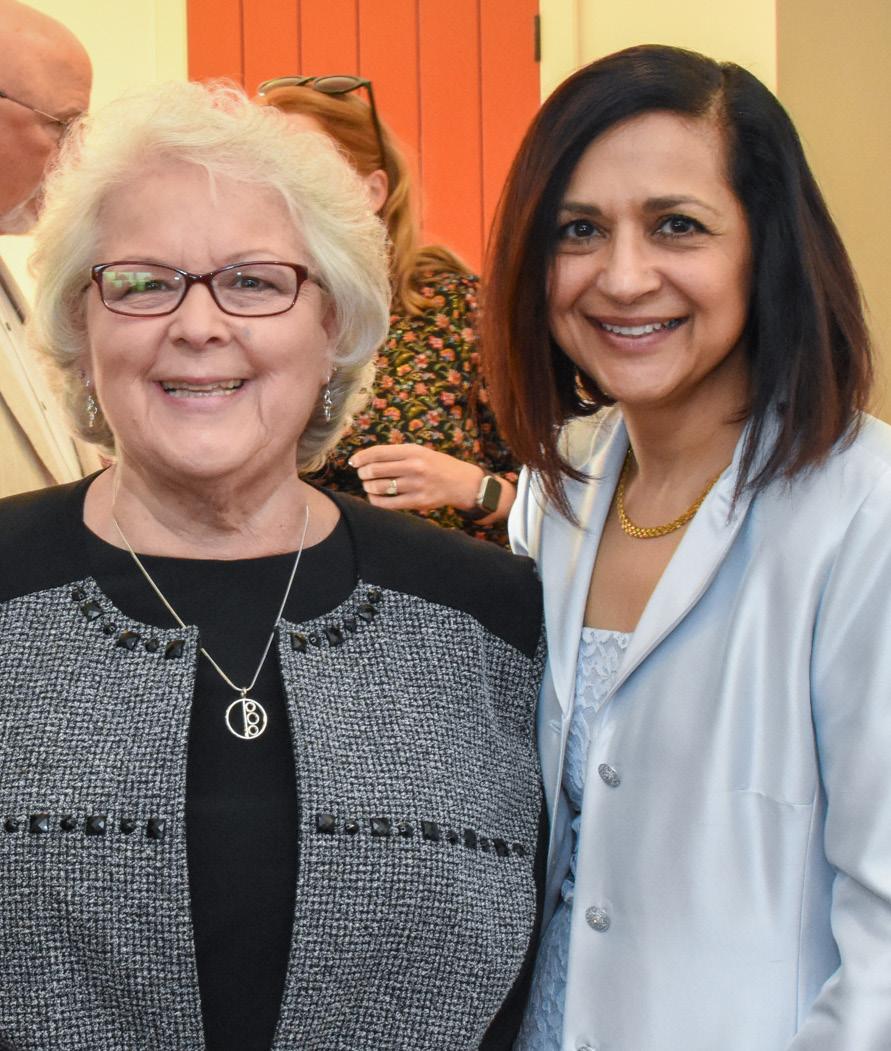
WITH KENCREST
CONNECT
Facebook @KenCrest Twitter @KenCrest Instagram @KenCrestServices LinkedIn @KenCrest
23 KENCREST.ORG







 By Sydney Kerelo
By Sydney Kerelo












 By Sydney Kerelo
By Sydney Kerelo
















